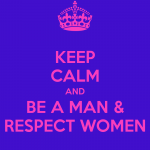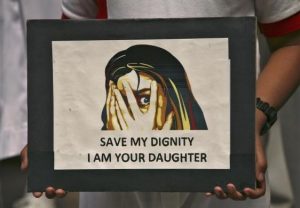 Violence against women in India is an issue rooted in hypocrite societal norms and women’s economic dependence. Biased practices are underlined by laws favoring men. Inadequate policing and sluggish judicial practices often deny female victims proper protection and justice. Though we also see female participation in public life and laws have been amended, India still has a long way to go to make Indian women equal citizens in their own country.
Violence against women in India is an issue rooted in hypocrite societal norms and women’s economic dependence. Biased practices are underlined by laws favoring men. Inadequate policing and sluggish judicial practices often deny female victims proper protection and justice. Though we also see female participation in public life and laws have been amended, India still has a long way to go to make Indian women equal citizens in their own country.
A zero-tolerance policy imposes automatic punishment for violating of a stated rule, with the intention of eliminating undesirable conduct in a society. Zero-tolerance policies forbid persons in positions of authority from exercising discretion or changing punishments to fit the circumstances subjectively; they are required to impose a pre-determined punishment regardless of individual culpability, justifying circumstances, or history. This pre-determined punishment need not be severe, but it is always meted out.
Zero-tolerance policies are studied in criminology and are common in formal and informal policing systems around the world. The policies also appear in informal situations where there may be sexual harassment or Internet misuse in educational and workplace environments.
policing systems around the world. The policies also appear in informal situations where there may be sexual harassment or Internet misuse in educational and workplace environments.
 Today when Asia’s third-largest economy is now in its longest slump for a quarter century, and has to face too many odds due to lethargic decision making culture, I think zero tolerance is the need of hour. Well, the new Narendra Modi Government’s pledge of zero-tolerance for violence against women, and requisite steps to strengthen the criminal justice system for its effective implementation is applauded.
Today when Asia’s third-largest economy is now in its longest slump for a quarter century, and has to face too many odds due to lethargic decision making culture, I think zero tolerance is the need of hour. Well, the new Narendra Modi Government’s pledge of zero-tolerance for violence against women, and requisite steps to strengthen the criminal justice system for its effective implementation is applauded.
India seems to have been plagued in the recent past with loads of horrifying incidents such as sexual assault and molestation; frequent news of gang rapes are a shame on our law and order. Women in this country are shaken to the core. Let’s stop making baseless arguments regarding our culture and ethos. Another issue regarding the size and diversity of our country is being dragged a bit too much.
 Violence against women comes in variety of forms such as domestic violence, dowry deaths, acid attacks, honor killings, rape, abduction, and cruelty by husbands and in-laws. One of the key challenges is the dowry practice; the bride’s family giving gifts of cash and kind to the groom and his family. Many times the groom’s family ill-treats the bride if such demands are not met with. To protect women against this threat the Indian government had passed the Dowry Prohibition Act and the Protection of Women from Domestic Violence Act and cruelty under Sec 498A of the Indian Penal Code. In 2012, according to the National Crime Records Bureau (NCRB), dowry deaths – or murders of women by the groom or in-laws because of unmet high dowry expectations – constituted 3.4% of all crimes against women. In other words, last year in India on average 22 women were killed per day because their families could not meet dowry demands.
Violence against women comes in variety of forms such as domestic violence, dowry deaths, acid attacks, honor killings, rape, abduction, and cruelty by husbands and in-laws. One of the key challenges is the dowry practice; the bride’s family giving gifts of cash and kind to the groom and his family. Many times the groom’s family ill-treats the bride if such demands are not met with. To protect women against this threat the Indian government had passed the Dowry Prohibition Act and the Protection of Women from Domestic Violence Act and cruelty under Sec 498A of the Indian Penal Code. In 2012, according to the National Crime Records Bureau (NCRB), dowry deaths – or murders of women by the groom or in-laws because of unmet high dowry expectations – constituted 3.4% of all crimes against women. In other words, last year in India on average 22 women were killed per day because their families could not meet dowry demands.
Legal experts point out that many rapes go unreported. Due to “family’s honor” many complaint files are withdrawn and in many cases the police do not give a fair hearing. Medical evidence is often unrecorded making it easy for offenders to pass scot free under prevailing laws. India’s societal changes have been engineered by women getting access to education and jobs. However on the ground regressive notions and crimes continue to halt women from getting out of their homes and joining the work force.
complaint files are withdrawn and in many cases the police do not give a fair hearing. Medical evidence is often unrecorded making it easy for offenders to pass scot free under prevailing laws. India’s societal changes have been engineered by women getting access to education and jobs. However on the ground regressive notions and crimes continue to halt women from getting out of their homes and joining the work force.
Many activists argue that the rising number of women parliamentarians and the presence of many high profile women in India’s political parties and public offices will act as only ornamental if effective laws and mindsets are not altered to safeguard ordinary women.
 To prevent the crime rate further speedier delivery of justice will serve as an effective solution. From 1953 to 2011, rape cases all over the country went up by 873 per cent, the only way left is to deal with the problem efficiently, expeditiously and in a specific time frame. To drive home a strong message that the judiciary will respond seriously against all such crimes. Let’s hope for the best to happen with the announcement by Narendra Modi Government to strengthen the criminal justice system for its effective implementation.
To prevent the crime rate further speedier delivery of justice will serve as an effective solution. From 1953 to 2011, rape cases all over the country went up by 873 per cent, the only way left is to deal with the problem efficiently, expeditiously and in a specific time frame. To drive home a strong message that the judiciary will respond seriously against all such crimes. Let’s hope for the best to happen with the announcement by Narendra Modi Government to strengthen the criminal justice system for its effective implementation.
“One in three women may suffer from abuse and violence in her lifetime. This is an appalling human rights violation, yet it remains one of the invisible and under-recognized pandemics of our time.” – Nicole Kidman













































